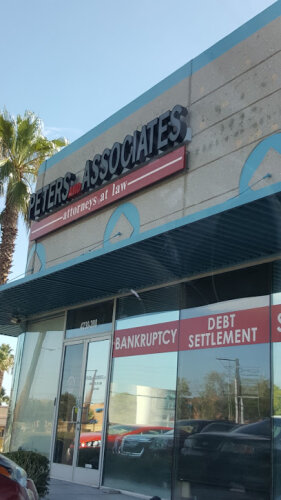Best Housing, Construction & Development Lawyers in Las Vegas
Share your needs with us, get contacted by law firms.
Free. Takes 2 min.
Free Guide to Hiring a Real Estate Lawyer
List of the best lawyers in Las Vegas, United States
About Housing, Construction & Development Law in Las Vegas, United States
Housing, construction and development law in Las Vegas covers a wide set of issues that affect homeowners, tenants, landlords, property developers, builders, subcontractors and local government. Common legal topics include landlord-tenant disputes, building permits and inspections, contractor licensing and enforcement, construction contracts and change orders, mechanic's liens and payment disputes, zoning and land-use approvals, developer and homeowners association matters, and construction-defect claims. Because Las Vegas sits in Clark County and is governed both by municipal codes and Nevada state law, projects and disputes frequently involve a mix of local rules, county regulations and state statutes.
The Las Vegas market is dynamic - residential and commercial construction activity can be intense, and the region's regulatory environment emphasizes proper permitting, licensed contractors and code compliance. For most parties, early legal guidance helps prevent small problems from becoming expensive disputes.
Why You May Need a Lawyer
People seek lawyers in housing, construction and development for many practical reasons. Lawyers can help before construction begins by reviewing contracts, advising on permits and zoning, and conducting due diligence on title and restrictions. During construction they can assist with contract negotiation, change-order disputes, payment claims, lien preparation and enforcement, and handling code enforcement notices or stop-work orders.
After construction, attorneys represent clients in construction-defect claims, warranty disputes, arbitration or litigation, and in interactions with homeowners associations and municipal regulators. Landlord-tenant lawyers handle evictions, repair-and-deduct matters, security deposit claims and lease drafting or enforcement. If you are a homeowner facing a contractor who is not finishing work, or a contractor who is not being paid, an attorney can advise on remedies and timing for actions such as filing a mechanic's lien or a lawsuit.
Local Laws Overview
Nevada state law provides the backbone for many housing and construction rules - including statutes that govern landlord-tenant relations, contractor licensing, homeowners associations and remedies for construction defects or nonpayment. Clark County and the City of Las Vegas have their own building codes, zoning ordinances and permitting processes that apply to most projects in the metropolitan area.
Contractor licensing is regulated at the state level. Contractors working on projects in Las Vegas generally must be licensed and bonded under Nevada rules. Hiring an unlicensed contractor can create legal and financial risks, and licensed contractors are subject to complaint and enforcement procedures administered by the state licensing board.
Permits and inspections are required for most new construction, additions, major alterations and certain repairs. Local building departments enforce building, electrical, plumbing and mechanical codes and may issue stop-work orders or civil penalties for noncompliant work. Zoning and land-use approvals are required for development projects and often require variances, conditional-use permits or other discretionary approvals from local planning bodies.
Mechanic's liens and payment remedies give builders, subcontractors and suppliers a way to secure payment against the property where work or materials were provided. Those remedies have strict procedural and timing requirements. Homeowners facing a lien should review their contract and payment history closely and may have defenses if the contractor was unlicensed or the work was defective.
Landlord-tenant matters are governed by Nevada statutes and local procedures. The law covers habitability standards, security deposit handling, notice requirements for termination and eviction, and remedies for breach of lease. Eviction procedures are handled in local courts, and failing to follow statutory notice and filing requirements can delay or invalidate an eviction.
Frequently Asked Questions
What should I check before hiring a contractor in Las Vegas?
Before hiring, verify the contractor's state license and bonding status with the relevant licensing board, check references and past work, get a written contract that clearly states scope, price, timeline and warranty, confirm that the contractor carries insurance, and ask for copies of permits the contractor will pull. Put important promises in writing and keep records of communications, payments and change orders.
Do I need a written contract for home improvement work?
Yes - a written contract is strongly recommended for most projects. A clear written contract reduces misunderstandings and provides essential evidence if a dispute arises. The contract should identify the parties, describe the scope of work, list materials and schedules, specify payment terms and dispute resolution procedures, and address warranties and termination rights.
How do mechanic's liens work and how can I protect myself?
A mechanic's lien is a security interest that a contractor, subcontractor or supplier can place on real property to secure payment for labor or materials. Filing requirements and deadlines are strict and vary by claim type. To protect yourself as an owner, require lien waivers as payments are made, monitor the project budget, keep copies of contracts and payments, and verify liens are discharged before sale or refinancing. Contractors should track deadlines and provide required notices to preserve lien rights.
What are my rights if my landlord will not make needed repairs?
Tenants have rights related to habitability and essential services. If repairs are not made after proper notice, remedies may include requesting local code enforcement inspections, using rent remedy options allowed by law, pursuing damages or rent abatement, or in some cases arranging repairs and deducting reasonable costs from rent if the law authorizes that step. Follow statutory notice requirements and document all communications and conditions with photos and dated records.
How does eviction work in Las Vegas and how long does it take?
Evictions must follow Nevada law and local court procedures. Typically an eviction begins with a written notice from the landlord, followed by a formal court filing if the tenant does not comply. Courts conduct hearings and may issue writs of restitution to remove a tenant. Timeframes vary depending on notice periods, court schedules and whether the tenant contests the eviction. Acting quickly and following statutory rules is critical for both landlords and tenants.
What should be included in a construction contract to avoid disputes?
Key elements include a detailed scope of work, specifications and plans, price and payment schedule, change-order process, project timeline and milestones, permit and inspection responsibilities, insurance and bonding information, warranty terms, dispute resolution method (mediation, arbitration or litigation) and termination clauses. Clarity on materials, cleanup and subcontractor relationships reduces later conflicts.
Can homeowners sue for construction defects, and what is the timeline?
Homeowners can pursue claims for construction defects against contractors, developers or design professionals. Claims may be based on breach of contract, negligence, breach of warranty or statutory protections. Time limits and notice requirements apply and differ by claim type and project. Because defect issues can involve expert inspection, prompt evaluation and preservation of evidence is important.
What happens if I hire an unlicensed contractor?
Hiring an unlicensed contractor can limit available remedies and may expose both the homeowner and the contractor to civil penalties. In some cases, unlicensed work can affect insurance coverage and the ability to enforce collection remedies. It is generally safer to hire licensed, insured contractors and verify credentials before work begins.
How can I enforce payment as a subcontractor or supplier?
Subcontractors and suppliers commonly use invoices, payment notices, stop-work rights specified by contract, and mechanic's liens where allowed. Promptly serving preliminary notices when required, keeping detailed records of work and deliveries, and complying with lien filing procedures are critical. If informal collection fails, legal action or arbitration may be necessary to recover unpaid amounts.
When is litigation necessary versus mediation or arbitration?
Mediation and arbitration offer alternatives to litigation that can be faster and less costly. Many construction contracts contain mandatory ADR clauses requiring disputes to go to mediation or arbitration before court. Litigation may be appropriate when statutory remedies require court action, when a party needs injunctive relief or when ADR is not permitted by contract or is unlikely to resolve the dispute. Consult an attorney early to evaluate the best path based on the contract, damages at stake and desired outcomes.
Additional Resources
Useful local and state resources include the Clark County Building Department and permit offices, the City of Las Vegas Building and Safety Division, the Nevada State Contractors Board for licensing and complaints, the Nevada Real Estate Division for landlord and real estate concerns, and local courts that handle landlord-tenant and construction disputes. Consumer protection offices and state attorney general resources can help with fraud or deceptive-practice complaints. Nonprofit legal aid organizations and bar association lawyer referral services can help people find low-cost or pro bono legal help.
Next Steps
If you need legal assistance in housing, construction or development matters in Las Vegas, take these practical steps:
- Gather and organize all documents - contracts, invoices, permits, photographs, correspondence and payment records. Clear documentation is critical.
- Preserve evidence - keep original documents, back up digital records, and photograph the work site and defects with dates.
- Verify licensing and permit status for contractors and the project with appropriate local and state agencies.
- Attempt to resolve the dispute directly in writing - send a clear demand letter that states the problem, what you want and a reasonable deadline.
- If the issue is urgent or unresolved, consult a lawyer experienced in local housing, construction and development law. Ask about initial consultations, fee structures and whether the attorney handles ADR or litigation.
- Consider alternative dispute resolution when appropriate, but act promptly if statutory notice or filing deadlines may apply.
Early legal advice can preserve remedies, meet strict procedural deadlines and improve the chance of a practical resolution. If cost is a concern, ask about limited-scope representation, contingency arrangements or referral to legal aid resources.
Lawzana helps you find the best lawyers and law firms in Las Vegas through a curated and pre-screened list of qualified legal professionals. Our platform offers rankings and detailed profiles of attorneys and law firms, allowing you to compare based on practice areas, including Housing, Construction & Development, experience, and client feedback.
Each profile includes a description of the firm's areas of practice, client reviews, team members and partners, year of establishment, spoken languages, office locations, contact information, social media presence, and any published articles or resources. Most firms on our platform speak English and are experienced in both local and international legal matters.
Get a quote from top-rated law firms in Las Vegas, United States — quickly, securely, and without unnecessary hassle.
Disclaimer:
The information provided on this page is for general informational purposes only and does not constitute legal advice. While we strive to ensure the accuracy and relevance of the content, legal information may change over time, and interpretations of the law can vary. You should always consult with a qualified legal professional for advice specific to your situation.
We disclaim all liability for actions taken or not taken based on the content of this page. If you believe any information is incorrect or outdated, please contact us, and we will review and update it where appropriate.











